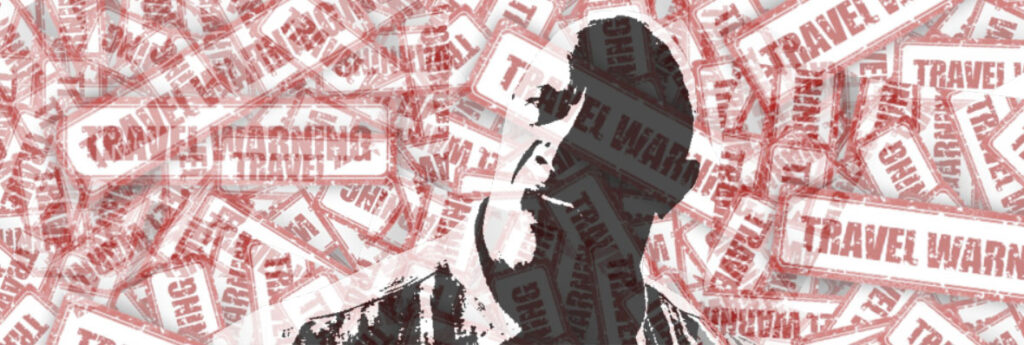There are few things more irksome – and damaging – to a destination than receiving a travel advisory, especially from the UK or US. After all, at the end of the day, such notices tend to scare off travellers and tour suppliers. But while sometimes warranted, the warnings can also occasionally be blanket statements tenuously based on the reality of local conditions, politically motivated, or mired in bureaucracy that is painfully slow to update and evolve.
As an example, when the World Health Organization issued an advisory against Toronto over SARS in 2003, few in the city (who observed hysterical daily news reports on CNN and elsewhere) would have disagreed that the warning was an over-reaction and that the outbreak, which was mainly contained to a few hospitals, affected city life in any way.
I can recall attending a French tourism trade show at Exhibition Place at the time with two dozen or so fearful French suppliers who had travelled directly from the airport – masked to the max – for the meetings (the more things change…!), but after an hour on the ground realized the gear was unnecessary and ditched it.
Yet, while the advisory only lasted a week, the damage was done and, according to the Ontario government, which at the time called the warning “unjustified,” the city would ultimately lose nearly a billion dollars, over half of it in the tourism industry.
Now, with travel advisories having been placed on several Caribbean destinations due to the increase in COVID-19 cases attributed to the delta variant, a leading tourism executive claims the region is being unfairly targeted and that travel to the destination is safe thanks to effective health safety measures and a continued commitment to protect both employees and visitors.
Caribbean Hotel and Tourism Association (CHTA) acting director and CEO Vanessa Ledesma says there has been no indication that the increase in travel to the region over the past several months has contributed to any significant spread of the virus.
“According to contact tracing analysis provided by several of the region’s destinations, which are monitoring this, the level of COVID-19 transmission between residents and visitors has been negligible,” she says, adding that testing of departing travellers returning to major source markets has shown insignificant positivity rates.
The travel trade veteran agrees that travel warnings based on COVID-19 positivity levels can be misleading. “We have gone to great lengths to produce the safest possible corridors in our tourism-related communities,” she assures, adding that “Caribbean travel is safe and continues to get safer.”
Recently, Donovan White, director of tourism for Jamaica (one of the affected countries), reported that the positivity rate in the island’s specially designed “resilience corridors” is less than one percent.
And while, the rate outside the corridor is certainly higher, it might be pointed out that even at its recent peak, Jamaica experienced 800 cases in a day ¬– considerably less than recent daily counts in Alberta.
And considerably less than most jurisdictions in the US, prompting many to perceive a certain hypocrisy, not unlike the sentiment shared by most Canadians, who, being among the most highly vaccinated nationalities in the world, similarly fume that it’s the US who, until now, wouldn’t let us in (at least by land).
Or when a destination receives a warning because of a single (albeit tragic) high profile murder when many large cities may count dozens or even hundreds in any given year, yet escape sanction.
Travel warnings in general can also cause ire when they are issued by one jurisdiction but not shared by others. What do they see that others don’t goes the thinking.
As for the Caribbean, Ledesma says the region’s commitment to health safety in fact started long before the beginning of the pandemic, but afterwards was accelerated through the formation of a COVID-19 Caribbean Tourism Task Force amongst regional stakeholders that helped jump-start the training of nearly 8,000 of the region’s tourism industry supervisors, managers, and owners.
That initiative continues as Caribbean countries continue extensive vaccination campaigns in their constituencies, prompting CHTA VP Nicola Madden-Greig to observe that “the rate of vaccination within the tourism and related communities is higher than the national averages,” which is good for both tourism employees and visitors and mitigates localized infection counts, even if it does little to sway advisory decisions.
Nevertheless, Madden-Greig acknowledges that, in the case of her region, only by pushing vaccinations can “the people of the Caribbean… control their own destiny” as a means of accelerating recovery, helping get people back to work faster, and generating revenue that governments desperately need to provide basic services.
But controlling one’s own destiny is not that easy. Ask ACTA, which this week took the federal government to task for its own outbound advisories – advising Canadians to continue to avoid cruising specifically and any non-essential travel generally.
It’s not that those advisories were issued, maintains the travel agent association, but that they haven’t been updated in 19 months, even as a myriad of protocols and particularly vaccine rates in both Canada and in many countries abroad suggest a more nuanced approach is warranted.
“Now that safe and highly effective vaccinations against COVID-19 are broadly available, Global Affairs Canada should update its global travel advisory,” ACTA states matter-of-factly.
Now that’s a warning that should be heeded.

